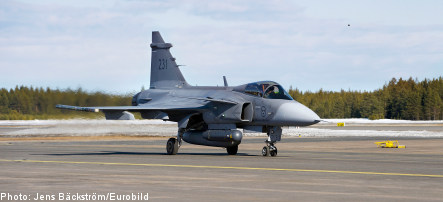“Yes, once we have taken the decision in the committee on December 15th,” said Cecilia Widegren, Moderate MP and deputy head of the Riksdag’s Defense Committee, to news agency TT.
A Defense committee majority has reached an agreement that Sweden should develop up to ten of the E/F model Jas if “Brazil or any other country” places an order for the fighter jet.
The proposition will be officially agreed by the Riksdag in two weeks time.
This would mean that the government in 2012 could be deciding on a development of up to ten aircraft, as long as the Swiss deal goes though.
However, the Greens want Sweden to upgrade the existing Gripen fighter jet and argue that the new E/F model would be too expensive.
The party spokesperson on defense, Peter Rådberg, said that it is very likely that it is a Super-Jas model that Switzerland wants, which would influence Sweden’s decision on future air defense.
He added that Switzerland is paying 22 billion kronor for the deal ($3.29 billion), which would indicate a billion kronor per fighter – a price tag significantly higher than for the existing planes.
“This is a lot more expensive. Previous calculations have estimated about half a billion per aircraft, so there’s a lot that indicate it is a E/F model that they are asking for, but we will see. We don’t have all the information at the moment,” he said to TT.
“Developing ten planes will cost tax payers enormous amounts of money.”
However, the Social Democrats are positive to the development of the ten super fighters, if the Swiss deal goes through.
“Getting this order at this point is good for Sweden. It is important both for the armed forces and for Sweden as a nation. It shows that Jas Gripen is a fighter and a defense system that has earned international respect,” said Social Democrat Peter Hultqvist, head of the Riksdag Committee on Defense, to TT.
Saab had prepared quotes of both a C/D and E/F version of the Jas Gripen fighter jet for Switzerland. At the Swiss press conference on Wednesday it was the E/F version that was discussed, according to TT.
On Thursday there were speculations in Swedish media as to what would happen if Switzerland later were to change its mind.
“All I can say is that the Swiss government yesterday chose Gripen after reviewing a number of other alternative possibilities for Switzerland,” defense minister Sten Tolgfors said to TT on Thursday.
“It is my firm belief that they are doing so because they are convinced that this is the best choice for Switzerland and that this choice will be anchored in the political system, so I choose not to speculate about that,” he said.



 Please whitelist us to continue reading.
Please whitelist us to continue reading.
Member comments